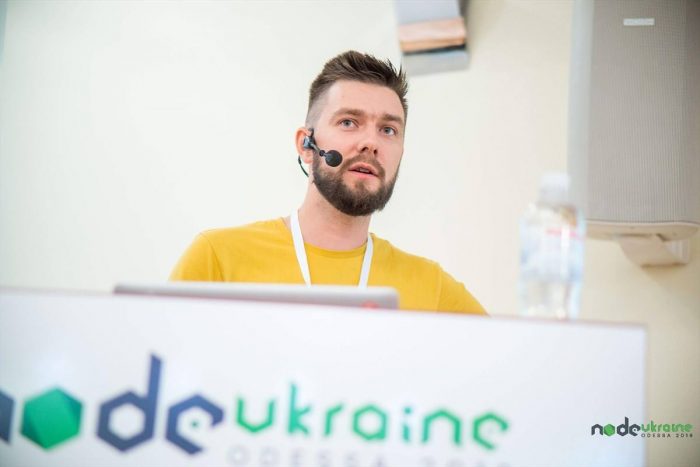Dmitry Chirkin Delivered a Report at NodeUkraine
On September 29th, the first Node.js conference NodeUkraine from the organizers of the popular OdessaJS took place in Odessa. Dmitry Chirkin participated in the conference as a NIX Solutions representative. For conference participants he presented the report “PostgreSQL for Hipsters, or Why Should Your Next Project be on PostgreSQL”. We asked Dmitry to share his impressions about the conference and speak more about his report.

About the Conference
Odessa has long hosted a large JavaScript conference – OdessaJS, which focuses more on frontend development. Since people formed a request for the backend, the organizers decided to hold a separate event dedicated to the development with Node.js. Most of the reports were interesting. I really liked the talk by Roman Sachenko about security in Node.js. He spoke about some of the typical mistakes developers make creating projects with Node.js. From his presentation, I unexpectedly discovered that there are also NoSQL-injections in Mongo. It turns out that this can happen even to projects that use all possible protection. In addition, the speaker presented a report in such an intriguing way, such that was fun and fascinating to listen.
About the Report
Why is it for hipsters? It just so happened that all my friends are developing not with PHP, Node.js or JavaScript. They are all “Pythoners”, “System Analysts”, so they call me a hipster because I develop using a modern programming language, which is also extremely popular now. There is some kind of a local meme that JavaScript developers are hipsters in a world of software development. Therefore, the report was called “PostgreSQL for Hipsters” that is for developers who are still developers, but not very experienced.
JavaScript is an easy language to start with. It has become a common practice that developing with JavaScript, people usually use Mongo or, in extreme cases, MySQL. Nobody ever applies PostgreSQL. I promote the idea that PostgreSQL is an ideal database to start with because it is very flexible and can fit a huge number of different projects, while Mongo is not suitable for every case. PostgreSQL is universal: when you do not know what to choose, choose PostgreSQL, not Mongo by default. At the conference, I talked about all sorts of things in PostgreSQL that provide flexibility, which makes it possible to implement such features that cannot be done in Mongo at all. I also provided examples of the code and interesting modules that appear in Node.js.
The report was designed mainly for Node.js developers. Judging by the reaction of the hall, I can say that everyone liked it. I tried to measure the quality of the reports by the number of questions that were asked afterward. I was asked if not more than all others, then definitely not less than the rest. Questions from the audience were interesting but really rather superficial. I felt that most people could not put together a proper question, because they had not yet encountered real-life problems with Postgres. When I asked who used PostgreSQL at work, only around 5-6 people from the entire audience raised their hands. I think that if people were more experienced, the questions would be more precise and technical. The whole report turned out to be a kind of Postgres advertisement. One of the listeners said: “I came here with questions, and you answered them all during your speech.” I think the report can be considered successful when expectations of the audience coincided with reality.
Impressions of the Conference
Conferences that take place in Ukraine are already really quite good, but they still have room for improvement. I am still impressed by the HighLoad ++ 2008 conference. Back then there were 5 or 6 streams in two days. I received so much useful information there that I still feel charged with that energy. There were a lot of unexpected and useful things. Coincidentally, at that time I was at the peak of my personal development, I learned a lot of new things, and then also went to the conference. I was ready to accept this information, and it appeared on time. Perhaps I have a “Baby duck syndrome”: the ducks consider as their mama whoever they see first. It is exactly the same with me: which conference I attended first, I consider the coolest one. Everything was great there: both the organization and the information, all the speakers were super cool.
You can watch Dmitry’s performance at NodeUkraine here. If you want to hear the report live, come to our November ThinkPHP #17 conference, where Dmitry will present an updated version of the report.




